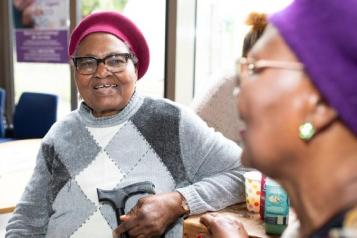Healthwatch England annual report 2019-20

Healthwatch England network year in numbers
- Last year, over 350,000 people shared their views, ideas and experiences about health and social care with their local Healthwatch.
- We also helped over 960,000 people access advice and information online, by phone and face-to-face.
- The Healthwatch network used this information to make over 5,870 recommendations to improve services based on people's experiences of care.
Responding to the pandemic
- More than 300,000 people viewed our online advice.
- We produced over 250 COVID-19 related reports for professionals about peoples experiences of care.
- Our 4,000 volunteers mobilised to support people self-isolating.
Highlights
Helping people get good quality care
People tell us it can be hard to access support when they need it most. In 2019-20 we used the experiences that people share with us to help:
- Highlight the challenges people face travelling to the hospital, especially in rural areas.
- Improve the way A&E performance is measured, with a greater emphasis on the speed of initial assessments.
The COVID-19 pandemic has disrupted routine treatment. We have worked closely with NHS and social care services to help spot problems, such as:
- The pain people have experienced when they have not been able to get NHS dental care and the need to improve access.
- The need to provide accurate and accessible information to avoid confusion and help people manage when their care is delayed.
Meeting people's needs
People’s needs depend on many factors, including what stage of life they’re at and whether they have a long-term condition. Thanks to the views people share with us, last year we saw:
- The introduction of NHS wellbeing checks for new mums after women told us they struggled to get mental health support during and after pregnancy.
- Our evidence show that less than half of people with dementia are having their care regularly reviewed by councils, potentially leaving many without critical support.
COVID-19 has resulted in unforeseen consequences, which people's stories have helped highlight. For example:
- Patients discharged rapidly from hospital told us that they did not get follow-up support at home.
- Deaf people, who read people’s lips, reported not being able to communicate with doctors wearing face masks.
Using people’s experiences to inform future services
With growing pressure on the care services, big questions need to be answered to ensure everybody gets the support they need. In 2019-20, we engaged over 40,000 people to help the NHS understand what they can do make future services better. Watch the Healthwatch England 'What people want in the next ten years' video here.
The COVID-19 pandemic has forced NHS and social care services to rapidly change. We have helped services understand the impact of these changes, like providing more digital healthcare.
We found that feeling safe and comfortable, understanding the benefits of remote appointments, and getting the format right is key to a good online and telephone consultation experience.
Based on the experiences shared with us, we developed a checklist for both patients and health and care professionals on how to get the most out of remote appointments.


